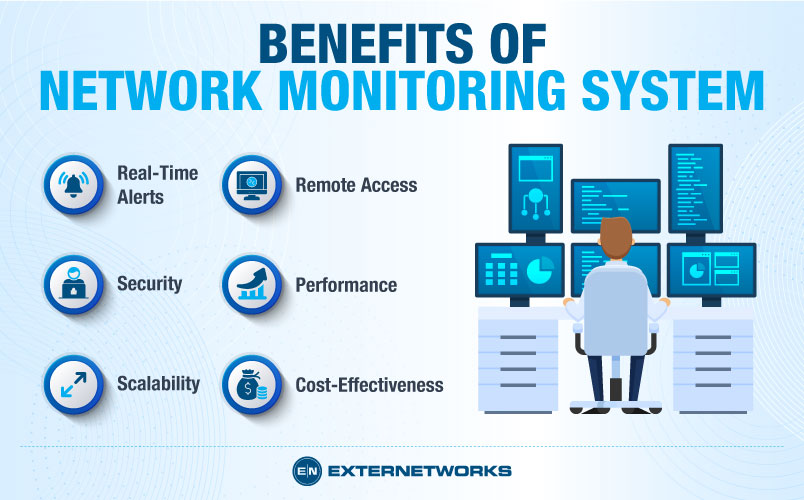28.4k views
Network monitoring systems (NMS) provide visibility into the performance of your network infrastructure. They allow you to monitor bandwidth usage, latency, packet loss, and other metrics.
Monitoring your network traffic is important because it helps you identify potential problems before they become major issues. In addition, NMS can help you troubleshoot issues or improve network performance. In this article, we will see what a network monitoring system is, how it works, features and the benefits of NMS in more detail.
Network Monitoring Systems (NMS) are software tools designed to monitor and analyze network traffic. They provide real-time visibility into network performance and security events. NMS solutions allow organizations to identify potential threats and vulnerabilities before impacting their networks.
A network monitoring solution provides information about the state of the network at any given time. This helps IT administrators to detect problems such as slowdowns or outages. In addition, it allows them to take action to resolve issues before they cause damage.
A network monitoring solution can be used for many different purposes, including:
There are many benefits of the Network Monitoring Systems. Some of these include:
Real-time alerts: You get immediate notification when something goes wrong.
Remote access: You can check your network’s status from anywhere in the world.
Security: You can keep track of what users do on your network.
Performance: You can monitor how fast your network is performing.
Scalability: If you add more computers to your network, you don’t have to worry about scalability.
Cost-effectiveness: Since you only need one central point for collecting data, you won’t have to buy multiple pieces of equipment.
The above are just some of the benefits of having a Network Management System, and there are many other advantages of having a Network Management Software.

There are many different network monitoring systems available today, and it can be difficult to decide which one is best for you. To make choosing a network monitoring system easier, we’ve put together some guidelines.
First, consider how often you need to check the status of your network. You may want to have a network monitoring system installed on all of your computers or just on certain ones.
Next, think about whether you want a centralized or a local network monitoring system. A centralized system has fewer moving parts and is less likely to break down. On the other hand, installing a local system requires access to every computer in your network, which could be difficult.
Finally, look at the features that are important to you. Do you want a system that gives you detailed reports showing exactly what’s going on in your network? Or would you rather have a simple dashboard showing the most important statistics?
The type of network monitoring systems you get depends on how frequently you’ll need to check the status and how much money you want to spend. There are three basic types of network monitoring systems.
The first is a hardware-based solution. These systems consist of hardware components such as routers, switches, hubs, and servers. The advantage of these systems is that they’re very reliable and will give you accurate results. However, they also cost more than software-based solutions.
The second type of network monitoring system is a software-based solution. Software-based solutions use software instead of hardware to gather and analyze data. They’re becoming increasingly popular because they’re not as expensive as hardware-based solutions.
The third type of network monitoring system uses both hardware and software. These systems combine the reliability of hardware with the flexibility of software.
If you’re looking for an inexpensive way to monitor your network, then a software-based solution might be right. However, if you need a high-quality product, it’s probably better to go with a hardware-based solution that costs a bit more.
When choosing a network monitoring systems, there are several features that you should consider. Here are some of the top features:
Real-Time Reporting: Real-time reporting lets you see what’s happening in your network. It provides alerts when something goes wrong so you can fix the problem before it gets worse.
Alerting: Alerting allows you to create rules that automatically send notifications when certain conditions occur. For example, you could set up an alert rule that sends an email whenever a specific port receives too many connections.
Remote Access: Remote access gives you remote control over your network. With this feature, you can check out the status of your network from anywhere in the world.
Remote Management: Remote Management lets you perform various tasks from a web browser or mobile phone. For instance, you can remotely reboot computers, shut down servers, and change passwords.
Data Logging: Data logging records everything that happens on your network. This includes every packet sent through the network, every IP address used, and every error message received.
You’ve got lots of options when it comes to network monitoring systems. However, not all of them are created equal. When choosing a network monitoring system for your home or business, here are three things to keep in mind:
Cost: The cost of a network monitoring system depends on how much data you want to log in and how often you wish to receive reports. Some network monitoring systems have free trial periods, while others require annual subscriptions.
Reliability: A reliable network monitoring system will give you accurate results. If a network monitoring system isn’t working properly, you’ll get inaccurate readings. Make sure that you choose a network monitoring system tested thoroughly.
Support: A good network monitoring system will offer support when you need it. Many companies offer 24-hour telephone customer service, online help forums, and live chat sessions.
If you’re looking for a network monitoring systems, make sure that you know exactly what you need. There are plenty of different types of network monitoring systems available today, and choose one that best suits your needs and budget.
